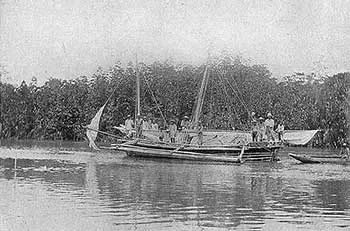Murderer–Thief in Batangas Sentenced to Death by Military Commission in 1901
[In this article: military government in Batangas, military commission Philippines, Philippine–American War, Claudio Marco, Hilario Trimilios, Florentino Trimilios, murder, assault with intent to kill]
Initial American rule over the Philippines in 1898 was performed by a Military Governor until such time when a civil Governor General was appointed. Even then, because the Philippine–American War had flared up, specific areas in the country were not immediately turned over to the new civil government but only after each had been pacified – the term used in the era to mean “subjugate” – by the United States Army.
In the case of Batangas, the province was not returned to civilian rule until July 19021. This was why an obscure case of theft and murder committed in the island of Maricaban in the present–day town of Tingloy was tried before a military commission2 convened in Manila in 1901.
READ: “Acts of the Philippine Commission in 1902 Concerning Batangas”
Presumably, a fight ensued. Marco came at Trimilios with a knife and managed to kill the latter. Trimilio’s brother Florentino, who must have heard the commotion or cry for help, came to help. He, too, was assaulted and “grievously wonded… so that his intestines protruded from the wound inflicted.”
For the killing of Hilario Trimilios, the military commission slapped Marco with the charge of murder:
“In that Claudio Marco, native, did willfully, feloniously and with malice aforethought murder and kill one Hilario Trimilios, native, by stabbing him with a knife held in the hands of the said Claudio Marco, thereby inflicting upon the person of the said Hilario Trimilios wounds whereof he, the said Trimilios, then and there died. This in time of insurrection4, on board the sailing boat San Jose, in the bay of Batangas, near the town of Batangas, Batangas Province P.I. (for Philippine Islands), a place under the military government of the United States, on or about the 19th day of November 1900.”
“In that Claudio Marco, native, did willfully, feloniously and with malice aforethought assault one Florentino Tremilios, native, by stabbing him with a knife held in the hands of the said Claudio Marco, with intent then and there to kill and murder him, the said Florentino Trimilios. This, in the time of insurrection, on board the sailing boat San Jose, in the bay of Batangas, near the town of Batangas, Batangas Province, P.I., a place under the military government of the United States, on or about the 19the day of November 1900.”
To the first charge, Marco took exception to the words “willfully” and “feloniously” but pleaded guilty, instead, to manslaughter rather than murder. Both murder and manslaughter are crimes of homicide, but in legal terms, the latter is considered a “lighter” crime, something committed “in the heat of passion” and with the absence of previous malice to do harm5.
He also stated that the killing was done in the “town of Maricaban, island of Maricaban.” At the time, of course, Maricaban was a barrio of the town of San Luis. In the present day, it is part of the archipelagic town of Tingloy off the Calumpang Peninsula. He pleaded not guilty to the second charge of “assault with intent to kill” but pleaded guilty to “assault and battery,” presumably a lesser charge.
The military commission, however, cast aside his attempts to have the charges lowered and passed the following sentence:
“To be hung by the neck until dead, at such time and place as the reviewing authority may direct, two–thirds of the commission concurring therein.
“The sentence, approved by the department commander, is confirmed and will be duly executed at the City of Manila, Luzon, P.I. on the 9th day of August, A.D. 1901, under the direction of the provost–marshall–general.”
2 Along with most of the details of this article, from the document “Charges of Cruelty, Etc., to the Natives of the Philippines,” published February 1902 by the United States War Department.
3 According to Merriam–Webster online, a quartermaster is “a petty officer who attends to a ship's helm, binnacle, and signals.”
4 The word “insurrection” was used in reference to the Philippine–American War.
5 “Murder vs Manslaughter,” online at Encyclopedia.com.

